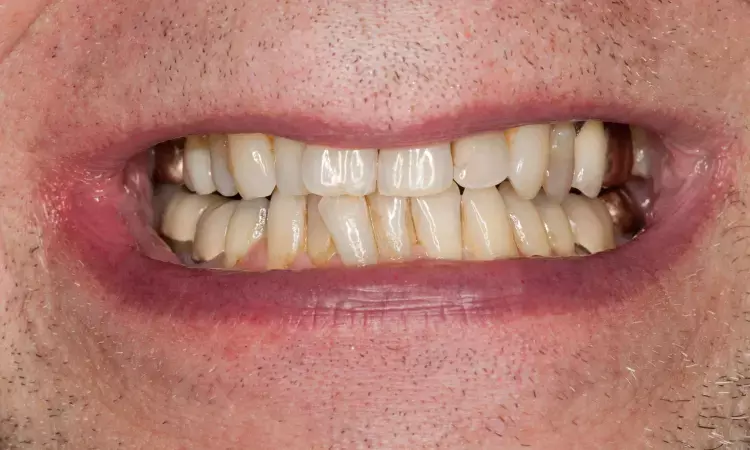- Home
- Medical news & Guidelines
- Anesthesiology
- Cardiology and CTVS
- Critical Care
- Dentistry
- Dermatology
- Diabetes and Endocrinology
- ENT
- Gastroenterology
- Medicine
- Nephrology
- Neurology
- Obstretics-Gynaecology
- Oncology
- Ophthalmology
- Orthopaedics
- Pediatrics-Neonatology
- Psychiatry
- Pulmonology
- Radiology
- Surgery
- Urology
- Laboratory Medicine
- Diet
- Nursing
- Paramedical
- Physiotherapy
- Health news
- Fact Check
- Bone Health Fact Check
- Brain Health Fact Check
- Cancer Related Fact Check
- Child Care Fact Check
- Dental and oral health fact check
- Diabetes and metabolic health fact check
- Diet and Nutrition Fact Check
- Eye and ENT Care Fact Check
- Fitness fact check
- Gut health fact check
- Heart health fact check
- Kidney health fact check
- Medical education fact check
- Men's health fact check
- Respiratory fact check
- Skin and hair care fact check
- Vaccine and Immunization fact check
- Women's health fact check
- AYUSH
- State News
- Andaman and Nicobar Islands
- Andhra Pradesh
- Arunachal Pradesh
- Assam
- Bihar
- Chandigarh
- Chattisgarh
- Dadra and Nagar Haveli
- Daman and Diu
- Delhi
- Goa
- Gujarat
- Haryana
- Himachal Pradesh
- Jammu & Kashmir
- Jharkhand
- Karnataka
- Kerala
- Ladakh
- Lakshadweep
- Madhya Pradesh
- Maharashtra
- Manipur
- Meghalaya
- Mizoram
- Nagaland
- Odisha
- Puducherry
- Punjab
- Rajasthan
- Sikkim
- Tamil Nadu
- Telangana
- Tripura
- Uttar Pradesh
- Uttrakhand
- West Bengal
- Medical Education
- Industry
Compared to non hypertensives, Patients of Hypertension have higher Decayed, Missing, and Filled Teeth scores: Study

Compared to non-hypertensives, Patients of Hypertension have higher Decayed, Missing, and Filled Teeth scores suggests a study published in the BMC Oral Health.
This study investigated the association between hypertension and oral health status, as measured by the Decayed, Missing, and Filled Teeth (DMFT) index, using data from the PERSIAN Guilan Cohort Study (PGCS).
A cross-sectional analysis was conducted on 10,520 participants aged 35–70 from Guilan Province, Northern Iran. Blood pressure measurements, oral examinations, and comprehensive data collection on demographic, lifestyle, and clinical factors were performed. The DMFT index was used to assess oral health status. Statistical analyses included Pearson correlation, t-tests, and multiple linear regression.
Results: The mean DMFT score was significantly higher in hypertensive participants than in non-hypertensive individuals (15.80 vs. 13.62, p < 0.001). Factors associated with increased DMFT scores in both hypertensive and non-hypertensive groups included older age, lower education levels, lower BMI, not flossing, smoking, alcohol use, and infrequent tooth brushing. In the hypertensive group, urban residency was additionally associated with higher DMFT scores.
For non-hypertensive participants, hookah use, not using mouthwash, and lower socioeconomic status were also linked to increased DMFT scores. A significant negative correlation was found between blood triglyceride levels and DMFT scores in individuals with hypertension (p = 0.037). This study establishes a significant association between hypertension and poor oral health, as evidenced by elevated DMFT scores. The findings highlight the importance of integrated healthcare approaches that consider cardiovascular and oral health.
Reference:
Samami, M., Joukar, F., Hassanipour, S. et al. Hypertension and DMFT: insights from the PERSIAN Guilan Cohort Study. BMC Oral Health 24, 1456 (2024). https://doi.org/10.1186/s12903-024-05236-z
Dr. Shravani Dali has completed her BDS from Pravara institute of medical sciences, loni. Following which she extensively worked in the healthcare sector for 2+ years. She has been actively involved in writing blogs in field of health and wellness. Currently she is pursuing her Masters of public health-health administration from Tata institute of social sciences. She can be contacted at editorial@medicaldialogues.in.
Dr Kamal Kant Kohli-MBBS, DTCD- a chest specialist with more than 30 years of practice and a flair for writing clinical articles, Dr Kamal Kant Kohli joined Medical Dialogues as a Chief Editor of Medical News. Besides writing articles, as an editor, he proofreads and verifies all the medical content published on Medical Dialogues including those coming from journals, studies,medical conferences,guidelines etc. Email: drkohli@medicaldialogues.in. Contact no. 011-43720751


